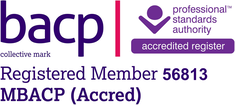My background

I am a qualified and BACP-accredited psychological therapist, and have worked for a number of years with adults, young people and children experiencing a variety of issues. I also have experience in mental health leadership and service development, fostering, community rehabilitation for offenders, communications roles within the charity sector and as a teacher.
I also have particular experience of the autism spectrum within my family. I understand some of the ways in which it can affect a person and those around them, and can offer you support if you identify as being on spectrum yourself, or are close to someone who is.
I also have particular experience of the autism spectrum within my family. I understand some of the ways in which it can affect a person and those around them, and can offer you support if you identify as being on spectrum yourself, or are close to someone who is.
My experience and qualifications
- Multi-Disciplinary Supervision (BPS Approved)
- Team Leader, Supervisor for psychological therapists with Off the Record Bristol.
- PG Dip in evidence-based therapeutic practice with children and young people
- Tutor and lecturer on Integrative Counselling training in Bristol
- BA (Hons) degree in Person-Centred Counselling (Middlesex University/Metanoia Institute)
- Specialist training in complicated and traumatic bereavement and loss (Wandsworth Bereavement Service)
- Regular ongoing professional development in Formative Psychology (Gerhard Zimmermann) - see below
- Telephone and online counselling with children and young people (ChildLine, NSPCC)
I have previously volunteered as a counsellor in London at Metanoia Counselling and Psychotherapy Service, Women and Health holistic therapy centre, Wandsworth Bereavement Service and ChildLine. I have experience of working with deaf colleagues and of supporting individuals on the autism spectrum.
To ensure I am practicing safely and to the best of my ability I undertake regular clinical supervision and professional development courses. I hold professional indemnity insurance, and as an accredited member of the British Association for Counselling and Psychotherapy, abide by its Code of Ethics.
My approach and influences
My original training was in the 'person-centred' approach, which underlined for me the importance of the relationship and fundamental trust in each individual's capacity to develop greater self-acceptance and make satisfying changes for ourselves.
I also draw strongly on neurobiological theory, including Polyvagal Theory. I approach you as unique; combining my experience to offer you a way of working which feels right for you. I offer an accepting, safe, confidential space to all my clients, within which I offer you the freedom to explore the difficulties you are currently facing in a supported way without judgement on my part.
I also draw strongly on neurobiological theory, including Polyvagal Theory. I approach you as unique; combining my experience to offer you a way of working which feels right for you. I offer an accepting, safe, confidential space to all my clients, within which I offer you the freedom to explore the difficulties you are currently facing in a supported way without judgement on my part.
- What is the Person-Centred approach?
This is a ‘humanistic’ approach founded by Carl Rogers which holds certain values about the individual and the therapeutic environment allowing a person to heal and thrive. The person-centred approach suggests that in order to be able to explore and reconcile the tensions we feel within ourselves and with others (for example relationship difficulties, painful memories, anger issues, anxiety, to name a few), we need to feel safe enough to experience them and learn new ways of being with them. The approach respects the life experiences in which these experiences develop and supports us to tap into and develop the fundamental coping mechanisms within ourselves which may not always seem available initially. I offer you a non-judgemental, responsive and respectful space in which to explore the difficulties you are having, allowing you the opportunity to learn deeply about yourself, to feel acceptance and make the changes you need to.
- What is Polyvagal Theory and Formative Psychology®?
Through my own therapeutic work I discovered the Formative approach and have found it to offer an outstanding way of connecting with our own abilities to form new behaviour and experiences which better serve us. This approach is ‘somatic-emotional’ – (‘soma’ relates to the body), based on ongoing neuroscientific research and focuses on the link between the behavioural shapes we make, our emotions and our experience of ourselves and our surroundings. Every moment of our lives we are forming our anatomical shape – all parts of our body are included in this (muscle, bone, organs, nerves, etc.), and our feelings are closely related to the shapes we make. Becoming aware of, and working with, these shapes allows us to develop a cooperative ‘dialogue’ between our thoughts, behaviour patterns and feelings. Developing this dialogue allows us to participate more fully in our lives, relieving the intense struggle we sometimes feel when grappling with difficult emotions or situations. I have found this approach to offer a real opportunity to make sustainable change in areas of difficulty such as stress, bereavement, allergies, anxiety, states of overwhelm such as panic attacks and more.
As the approach has itself evolved, it has come to incorporate the value of Stephen Porges' Polyvagal theory, to support individuals to make greater connections and with their resources and potential. It relates to the function of the vagus nerve and more information about it can be found in the 'Resources' section on this site.
My personal experience of Formative work is that it offers a sense of having “come home” – the opportunity to feel profound peace within oneself, and empowerment.
Formative Psychology® was founded and pioneered by renowned somatic therapist Stanley Keleman in the USA, and is also being developed by Gerhard Zimmermann, medical doctor and psychotherapist, in Germany. If you are interested in this approach, you can find out more about Stanley Keleman and this approach on his website. Gerhard Zimmermann also visits the UK twice a year, running a seminar and workshop in Southampton. If you'd like to find out more call or email me.
As the approach has itself evolved, it has come to incorporate the value of Stephen Porges' Polyvagal theory, to support individuals to make greater connections and with their resources and potential. It relates to the function of the vagus nerve and more information about it can be found in the 'Resources' section on this site.
My personal experience of Formative work is that it offers a sense of having “come home” – the opportunity to feel profound peace within oneself, and empowerment.
Formative Psychology® was founded and pioneered by renowned somatic therapist Stanley Keleman in the USA, and is also being developed by Gerhard Zimmermann, medical doctor and psychotherapist, in Germany. If you are interested in this approach, you can find out more about Stanley Keleman and this approach on his website. Gerhard Zimmermann also visits the UK twice a year, running a seminar and workshop in Southampton. If you'd like to find out more call or email me.


